Sub-Saharan Africa
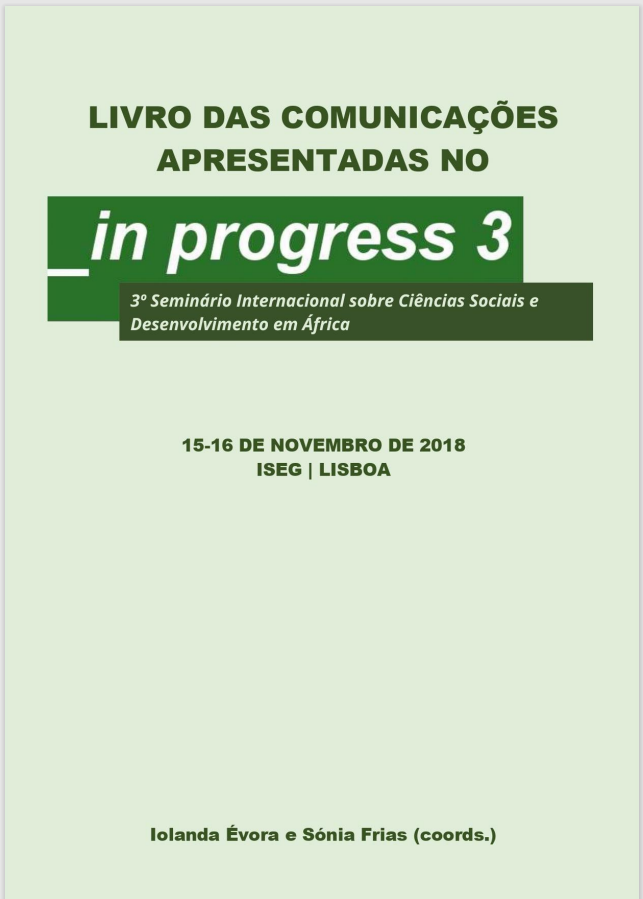
Book of Papers Presented at the In Progress 3 Seminar
Abstract:
This third edition of In Progress, Seminar on Social Sciences and Development in Africa brings together works by researchers and postgraduate students whose study and research theme is contemporary Africa and its development, supported by scientific currents that stimulate new approaches beyond the “development”, exploring the notions of “well-being” or “good living” and remaining close to currents of thought and debates between Africa, Asia and Latin America. The texts include themes such as: fieldwork: practical, theoretical and methodological issues; politics, civil society dynamics, development; culture, thought and change; strategies for cooperation and development; and populations, mobility and well-being. The second part of this work contains the reflections of the speakers invited to the In Progress 3 seminar, which include both a critical perspective on the dominant discourses and methodologies in the field of development policies linked to mobilities, economy and identities, as well as the contribution of financial growth for economic growth and several of the issues to be taken into account in discussions on economic sustainability, taking the example of SADC member countries. The final conference refers to the times and questions that are important to retain and what is important to reflect on in the context of social and human sciences, in particular, when the debate is about the (neo)colonial perspective and contemporary global challenges for African Studies.
Cite this e-book:
Évora, Iolanda e Sónia Frias (coord). 2024. Livro das Comunicações Apresentadas no In Progress 3 com Revisão por Pares : 15 a 16 de Novembro de 2018 no ISEG/ULisboa. Lisboa: ISEG – CEsA
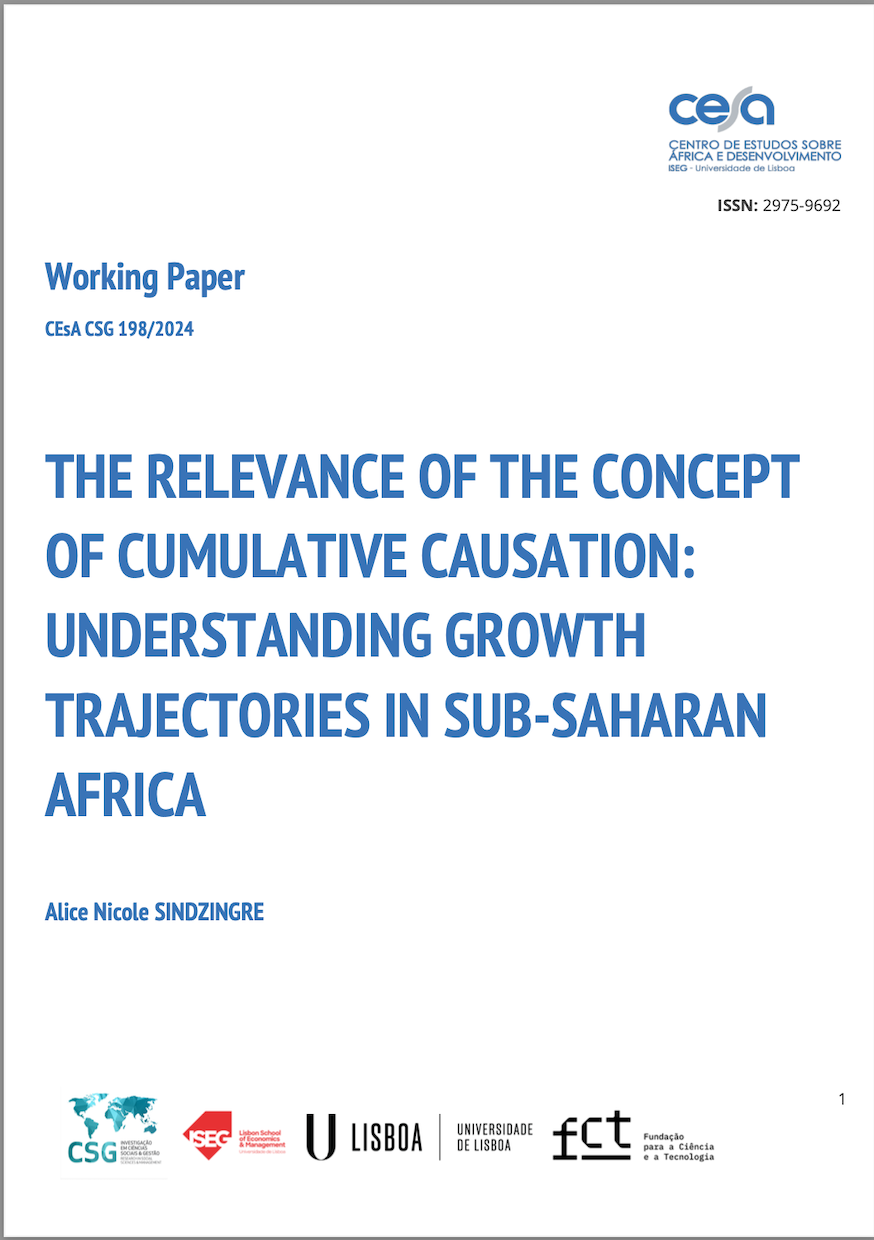
Working Paper 198/2024: The Relevance of the Concept of Cumulative Causation: Understanding growth trajectories in Sub-Saharan Africa
Abstract:
Differences in growth trajectories among countries – including the possibility of divergence -, are a central issue in economics. Mainstream economics explain growth processes via varieties of neoclassical models, even improved with concepts such as institutions. Yet such models have difficulties in providing accurate accounts of the growth trajectories of many developing countries, notably low-income ones. It is argued that the growth paths of low-income countries are more appropriately explained by the theoretical framework that relies on the nexus of concepts of cumulative causation, non-linearities, threshold effects, self-reinforcing processes, irreversibility, path dependence and traps – though this approach remains marginal in mainstream economic analyses of growth and development. Firstly, this nexus of concepts is a powerful framework concerning the possibility and explanation of dynamic divergence regarding growth between countries, as it exhibits properties such as: the possibility of cumulative, dynamically self-reinforcing, processes; the existence of thresholds and tipping points; multiple equilibria. Secondly, cumulative causation, by definition, involves a combination of causes: its conceptual framework allows for the integration of several dimensions – economic, political, social, cognitive -, whose combination results in either virtuous or vicious circles. In developing countries, these causes (and their coalescence) typically consist in economic structures (e.g., commodity-based export markets), political institutions and social norms (predatory regimes, high inequality) as well as types of public policies.
Cite this Working Paper:
Sindzingre, Alice Nicole (2024). “The Relevance of the Concept of Cumulative Causation: Understanding growth trajectories in Sub-Saharan Africa”. CEsA/CGS – Documentos de trabalho nº 198/2024
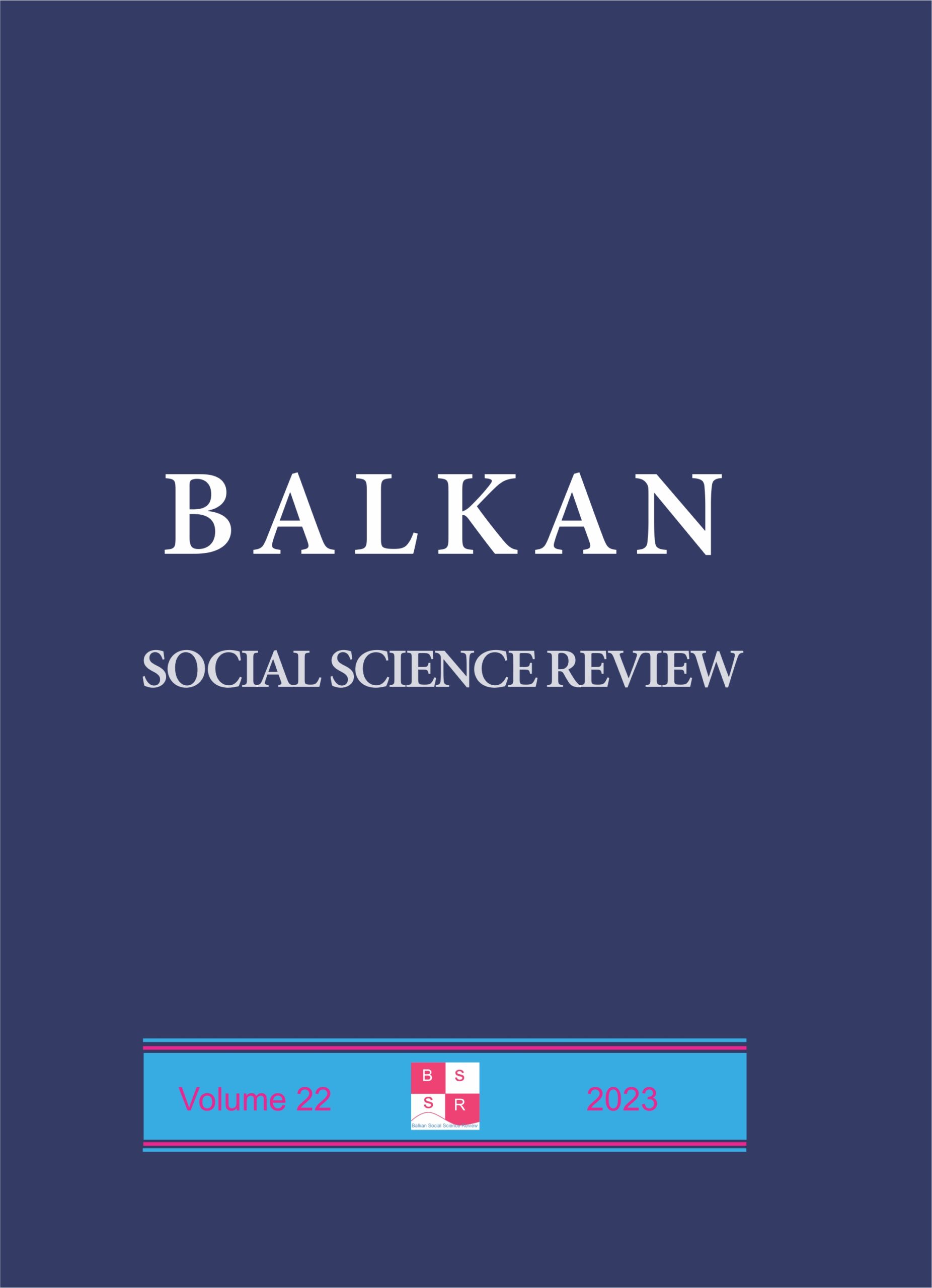
Understanding Social Realities of Internally Displaced Persons (IDPs) in the Federal Capital Territory of Nigeria (FCT), Abuja
Abstract:
This article examines the social realities of forcibly displaced persons in Nigeria, with a focus on internally displaced persons (IDPs) in the Federal Capital Territory (FCT) of Nigeria, Abuja. Internally displaced persons are individuals who have been forced from their homes or habitual places of residence and, unlike refugees, have not crossed the borders of their country. They remain under the primary protection of their governments and often seek refuge in their own countries. This study draws on secondary data sources and primary data collected from two IDPs campsites, arguing that most IDPs in the FCT, displaced by the Boko Haram insurgency live in makeshift and inhumane informal settlements in the peri-urban areas of Abuja City. These settlements also host the urban poor and other economic migrants in the country’s capital, occasionally leading to conflicts between them. The paper calls for the government to recognise the presence and condition of IDPs in the FCT and to work with relevant organisations to provide durable solutions to ensure that displaced persons can once again become productive members of society.
Cite this article:
BA-ANA-ITENEBE, C. A.; EDO, Z. O. (2023). Understanding Social Realities of Internally Displaced Persons (IDPs) in the Federal Capital Territory of Nigeria (FCT), Abuja. In: Balkan Social Science Review, Vol. 22, 213-231. https://doi.org/10.46763/BSSR232222213bai
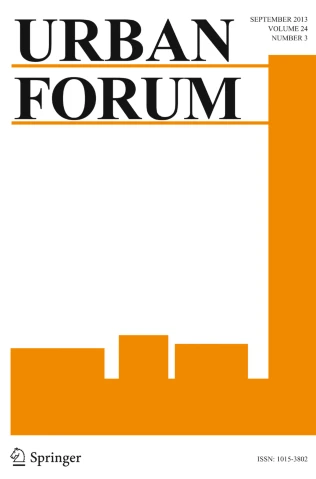
Armed Conflict and Urbanization in Cabo Delgado, Mozambique: A methodology for a critical inquiry
Abstract:
Mainstream urban theory fails to encompass urbanization in Africa. Among its many drivers, armed conflicts displace rural populations to cities, accelerating urban processes and impacting sustainability and governance — the phenomenon of conflict-induced urbanization. In the province of Cabo Delgado, a violent insurgency has been displacing thousands of civilians since 2017; many of whom have fled to the provincial capital Pemba, doubling its population in just 5 years. This article presents the theoretical framework and methodological design for an inquiry located within a contemporary critique of mainstream urban studies; the goal is to analyse conflict-induced urbanization in Pemba with a comparative case study, using participatory visual methods, for which a pilot study took place in September 2022. With this, the author aims to contribute to engaged urban studies in Mozambique and Portugal and to transform the trauma of war into opportunities for sustainable development and prosperity.
Cite this article:
Agostinho do Amaral, S. Armed Conflict and Urbanization in Cabo Delgado, Mozambique: A Methodology for a Critical Inquiry. Urban Forum (2023). https://doi.org/10.1007/s12132-023-09505-y
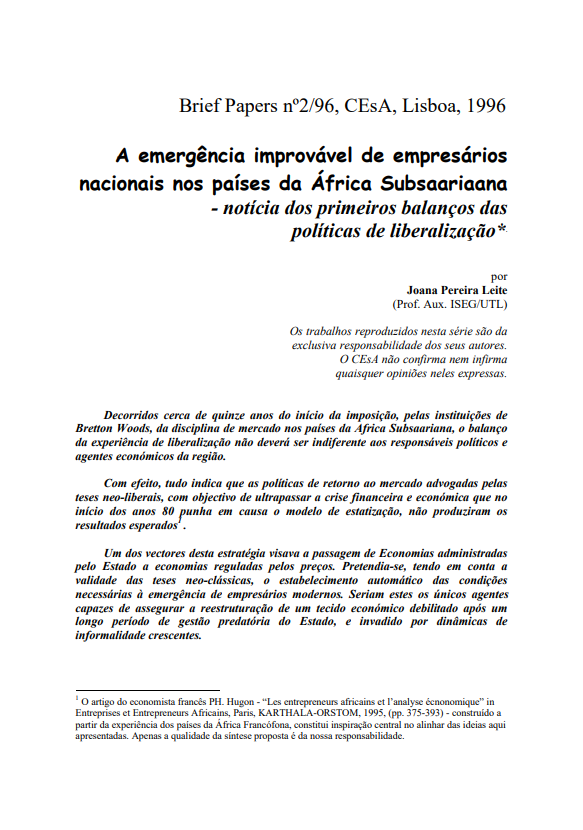
Brief Paper 2/1996: A Emergência Improvável de Empresários Nacionais nos Países da África Subsaariaana: Notícia dos primeiros balanços das políticas de liberalização
Abstract:
About fifteen years after the Bretton Woods institutions started imposing market discipline on the countries of Sub-Saharan Africa, the assessment of the liberalisation experience should not be indifferent to political leaders and economic players in the region. In fact, everything indicates that the policies of return to the market advocated by the neo-liberal theses, with the aim of overcoming the financial and economic crisis which, at the beginning of the 1980s, called the nationalisation model into question, did not produce the expected results. One of the vectors of this strategy was the transition from state-managed economies to price-regulated economies. Taking into account the validity of the neoclassical theses, the aim was the automatic establishment of the necessary conditions for the emergence of modern entrepreneurs. These would be the only agents capable of ensuring the restructuring of a weakened economic fabric after a long period of predatory management by the state, and invaded by growing dynamics of informality. A emergência improvável de empresários nacionais nos países da África Subsaariaana: notícia dos primeiros balanços das políticas de liberalização is not intended to recall the “formal/informal” debate, so dear to the economic literature of the last two decades. Bearing in mind the extreme economic complexity of African societies, the aim is simply to highlight some relevant, though not always evident, aspects of recent reflection on the difficult emergence of the African business class in the context of adjustment policies.
Quotation:
Leite, Joana Pereira. 1996. “A emergência improvável de empresários nacionais nos países da África Subsaariaana : notícia dos primeiros balanços das políticas de liberalização”. Instituto Superior de Economia e Gestão – CEsA Brief papers nº 2-1996
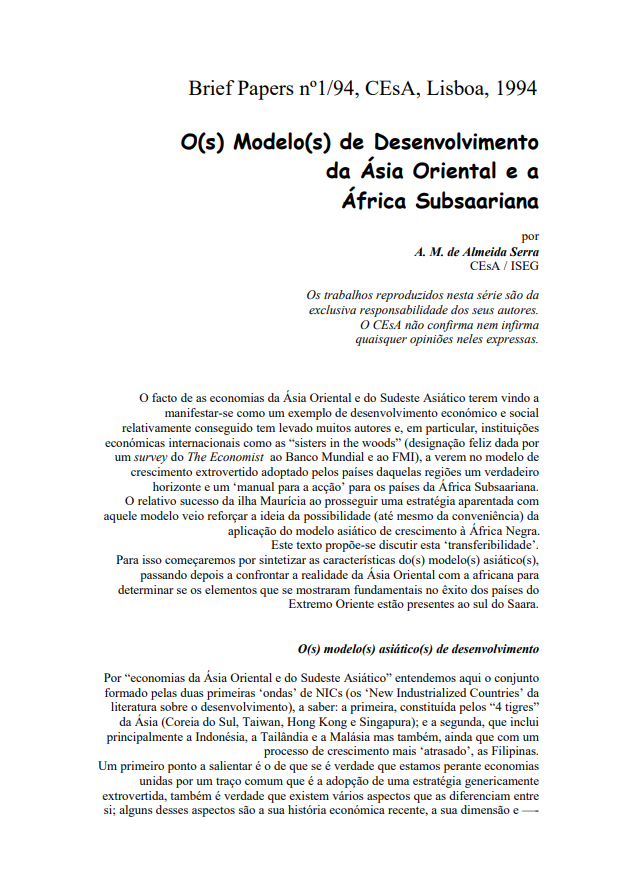
Brief Paper 1/1994: O(s) Modelo(s) de Desenvolvimento da Ásia Oriental e a África Subsaariana
Abstract:
The fact that the economies of East Asia and Southeast Asia have emerged as an example of relatively successful economic and social development has led many authors and, in particular, international economic institutions such as the “sisters in the woods” (the felicitous name given to the World Bank and the IMF by a survey in The Economist), to see the model of extroverted growth adopted by the countries of those regions as a real horizon and “manual for action” for the countries of Sub-Saharan Africa. The relative success of Mauritius in pursuing a strategy similar to this model has reinforced the idea that it is possible (and even desirable) to apply the Asian growth model to Black Africa. O(s) modelo(s) de desenvolvimento da Ásia Oriental e a África Subsaariana aims to discuss this “transferability”. To this end, we shall begin by summarising the characteristics of the Asian model(s), and then move on to confront the East Asian reality with that of Africa in order to determine whether the elements that proved fundamental to the success of the Far Eastern countries are present to the south of the Sahara.
Quotation:
Serra, António M. de Almeida. 1994. “O(s) modelo(s) de desenvolvimento da Ásia Oriental e a África Subsaariana”. Instituto Superior de Economia e Gestão – CEsA Brief papers nº 1-1994.





